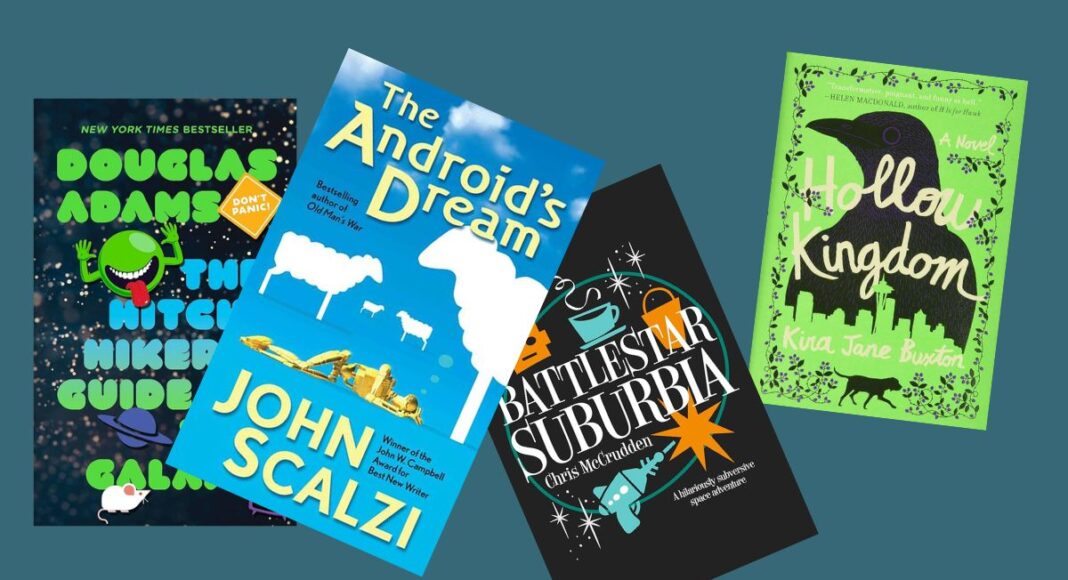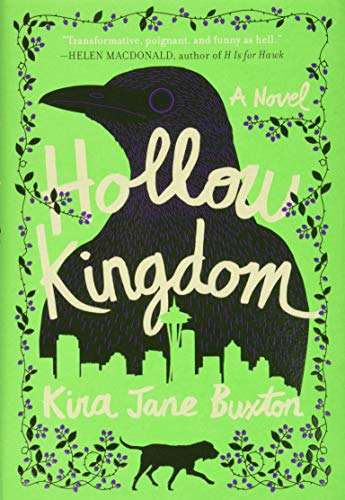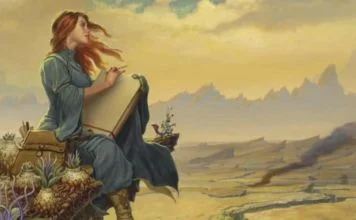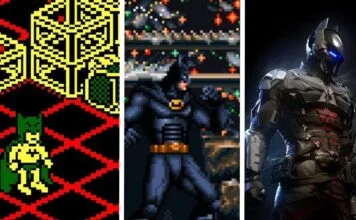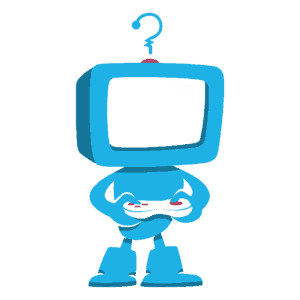Nerd Much? might get a small share of the sale if you click links on this page, as we are a part of various other affiliate programs. For more, read our Editorial Standards.
In the boundless universe of literature, where science fiction extends to the farthest reaches of imagination, there lies a unique hybrid genre filled with laughter and levity. I’m talking about the humor found in some of the best sci-fi comedy books of all time. These remarkable works offer an interstellar escape from the mundane, fusing the boundless potential of futuristic vistas with humor that echoes through the cosmos. From the legendary antics in Good Omens by Neil Gaiman and Terry Pratchett, to the innovative tales of new classics like Hollow Kingdom by Kira Jane Buxton, these titles illuminate the creative prowess of writers who envision the universe not only as a place of awe but as a playground of wit.
Funny sci-fi books have a special way of reflecting our own world back at us through the funhouse mirror of the future, alien societies, or technology gone hilariously awry. They offer a critique of our world, wrapped in satire and delivered with a punchline, making us laugh while also making us think. These stories remind us that, even as we hurtle through space on this pale blue dot, humor connects us all, transcending time and space.
As we dive into this list of hilarity and high adventure, let’s buckle up for a journey through time, space, and the infinite jest of the cosmos. Here are the top 22 funniest sci-fi books of all time curated by actual readers (unranked!):
1Hollow Kingdom by Kira Jane Buxton
Hollow Kingdom by Kira Jane Buxton, released in 2019, introduces readers to an apocalyptic Earth through the eyes of S.T., a domesticated crow with a fondness for humanity and junk food. The novel is a refreshing take on the zombie genre, with S.T. and his loyal dog companion embarking on a quest to save the remnants of human civilization. Buxton crafts a world teeming with animal perspectives, offering a hilarious and poignant commentary on humanity’s impact on the planet.
What sets Hollow Kingdom apart as a unique humorous gem is its inventive narration and the sheer absurdity of its premise. S.T.’s observations of the crumbling human world, combined with his attempts to mimic humanity, are both profoundly funny and touching. Buxton uses wit to explore themes of connection, survival, and the beauty of nature reclaiming the world. The humor is embedded in the unique characterizations of animals and their bewildered reactions to the humans’ self-inflicted demise, making Hollow Kingdom a standout in the sci-fi comedy genre for its originality, insight, and the laughter it provokes amidst a tale of apocalypse.
2Hitchhiker’s Guide to the Galaxy by Douglas Adams
The Hitchhiker’s Guide to the Galaxy by Douglas Adams, first published in 1979, begins as Earth is unceremoniously demolished to make way for a galactic freeway, thrusting the bewildered Arthur Dent into a wild voyage across the universe. Rescued by his friend Ford Prefect, a researcher for the eponymous guidebook for galactic hitchhikers, Arthur embarks on a series of misadventures with an unforgettable cast including Zaphod Beeblebrox, the two-headed ex-President of the Galaxy; Trillian, the only other human survivor; and Marvin, a depressed robot.
Adams’ masterpiece stands out for its brilliant blend of absurdist humor, wit, and satirical commentary on human nature, all set against the backdrop of an infinitely bizarre and imaginative cosmos. The humor arises from the clash between the mundane concerns of its characters and the outlandish realities of the universe, underscored by the guide’s dryly humorous observations. The book’s comedic genius lies in its ability to mock both the sci-fi genre and real-world absurdities, making The Hitchhiker’s Guide to the Galaxy a timeless classic that continues to entertain and amuse readers with its clever insights and eccentric humor.
3Good Omens by Neil Gaiman and Terry Pratchett
Good Omens, authored by Neil Gaiman and Terry Pratchett, is a masterful concoction of wit, wisdom, and whimsy, released in 1990. This novel spins the tale of an angel, Aziraphale, and a demon, Crowley, who, having grown rather fond of Earth, team up to prevent the apocalypse. The book is a satirical take on the biblical end times, featuring a misplaced Antichrist named Adam, a book of prophecies penned by a witch, and a cast of characters ranging from four bikers of the Apocalypse to a witchfinder army.
What makes Good Omens so humorous is its clever blend of the absurd with the mundane, poking fun at human nature, religious texts, and even the inefficiencies of celestial bureaucracies. Gaiman and Pratchett’s writing is sharp, packed with puns, irony, and a deep understanding of human idiosyncrasies, allowing them to craft a story that’s as thought-provoking as it is laugh-out-loud funny. It’s this ingenious narrative, combined with the authors’ knack for witty dialogue and situational comedy, that cements Good Omens as a pinnacle in the genre of sci-fi comedy books.
4Redshirts by John Scalzi
Redshirts by John Scalzi, released in 2012, is a clever and biting satire on the classic tropes of space opera TV shows, specifically targeting the cliché of expendable crew members (the eponymous “redshirts”) who often meet untimely ends. The book follows Ensign Andrew Dahl and his peers aboard the Universal Union starship Intrepid, as they quickly realize their roles as minor characters make them prime candidates for the next tragic casualty during away missions. Scalzi’s genius lies in his ability to mirror the absurdity of science fiction plot conveniences, using metafictional elements to explore the fate of these doomed characters with humor and insight.
What makes Redshirts so humorous is its self-awareness. Scalzi takes the familiar and beloved quirks of genre storytelling—predictable plot lines, thin character development for secondary characters, and deus ex machina resolutions—and flips them on their head, inviting the reader to laugh not only at the characters’ predicaments but also at the conventions of the genre itself. The novel is both a parody and a tribute, engaging fans with its witty commentary while offering a heartfelt nod to the narratives that inspire it.
5The Android’s Dream by John Scalzi
The Android’s Dream by John Scalzi, released in 2006, is a riotous blend of science fiction and comedy that takes readers on a wild ride through interstellar politics, diplomacy, and conspiracy. The story kicks off with a diplomatic incident that could lead to interstellar war: the deliberate emission of a fart during a meeting with an alien species, the Nidu. The incident’s absurdity sets the tone for a novel filled with unexpected twists, where the fate of humanity hinges on finding a rare breed of sheep, titled “The Android’s Dream.”
Scalzi’s novel is infused with his signature wit and a keen sense of the absurd, making it a standout in humorous sci-fi. The humor lies not just in its premise but in its execution, with clever dialogue, satirical takes on politics and society, and the bizarre yet brilliantly constructed plot. Scalzi masterfully balances the comedic elements with a genuinely engaging sci-fi story, making The Android’s Dream a must-read for those who enjoy their science fiction with a side of laughter. Its unique blend of humor, plot, and character has cemented its place as a favorite among fans of the genre.
6Agent to the Stars by John Scalzi
Agent to the Stars by John Scalzi, released in 2005, is a refreshing take on the alien first-contact story, told through the lens of Hollywood glam and satire. The novel introduces us to Thomas Stein, a successful young Hollywood agent, who is tasked with an unusual client: an alien race called the Yherajk. These benevolent extraterrestrials, made of gaseous matter and smelling like seafood gone bad, want to introduce themselves to humanity. However, aware of their potentially off-putting appearance and odor, they decide to hire Stein to help them achieve a positive public image.
What makes Agent to the Stars so humorous is Scalzi’s adept use of witty dialogue, sharp satire of the entertainment industry, and the absurd yet endearing premise of an alien race trying to navigate the complexities of Hollywood PR. Scalzi crafts a story that is not only a commentary on the superficiality of celebrity culture but also a heartwarming tale of understanding and acceptance. The juxtaposition of an everyday Hollywood agent dealing with the extraordinary task of alien introduction creates a fertile ground for comedy, making Agent to the Stars a standout in the sci-fi comedy genre.
7Battlestar Suburbia by Chris McCrudden
Battlestar Suburbia, released in 2018, is a comedic gem by Chris McCrudden that spins a tale of farcical futurism where machines have taken over and humans find themselves relegated to the lower rungs of society. The story kicks off with an ordinary man, Fred, and a cleaning robot, Pam, who accidentally become the galaxy’s most wanted and must navigate a world where toasters are in charge and humans are mere afterthoughts. The humor in Battlestar Suburbia stems from its absurd yet sharply observant look at our dependence on technology, flipping the script on who serves whom.
McCrudden crafts a universe brimming with witty puns, hilarious situations, and a deep satirical undercurrent that critiques modern life through the lens of a robot-dominated society. The book’s charm lies in its ability to make readers laugh at the ridiculousness of its characters’ predicaments while subtly nudging them to ponder the trajectory of our tech-saturated world. While it hasn’t been noted for any particular awards, Battlestar Suburbia stands out for its originality and clever humor, making it a notable entry in the sci-fi comedy genre.
8Will Save the Galaxy for Food by Yahtzee Croshaw
Will Save the Galaxy for Food by Yahtzee Croshaw, released in 2017, is a comedic science fiction novel that takes a satirical look at the life of a down-and-out star pilot in a universe where quantum tunneling has made traditional space travel obsolete. The story follows the protagonist, a pilot who once thrived in the era of interstellar exploration, as he navigates the challenges of unemployment in a future where his skills are no longer in demand. Croshaw crafts a universe filled with absurd situations and characters, including tourists seeking adventure in space and the mishaps that ensue when the protagonist is forced to impersonate a famous hero.
The humor in Will Save the Galaxy for Food stems from Croshaw’s sharp wit and keen sense of irony, poking fun at science fiction tropes and the often-glamorized concept of space exploration. The book excels in its ability to blend a cynical outlook on heroism and fame with laugh-out-loud scenarios, making it a standout in sci-fi comedy. While the novel did not receive any notable awards, its unique blend of humor, adventure, and social commentary has garnered a dedicated fanbase and critical acclaim for its insightful and entertaining take on the genre.
9To Say Nothing of the Dog by Connie Willis
To Say Nothing of the Dog by Connie Willis, released in 1998, is a delightful blend of science fiction, history, and comedy. The book is part of Willis’s Oxford Time Travel series and stands out for its humorous take on time travel and Victorian England. The story follows Ned Henry and Verity Kindle, two time-traveling historians who are sent back to the 19th century to correct an anomaly that threatens the timeline. Amidst the backdrop of boating on the Thames, Gothic novels, and an overly enthusiastic bulldog, the duo navigates a series of comedic misadventures.
The humor in To Say Nothing of the Dog arises from Willis’s clever use of historical incongruities, slapstick situations, and the absurdities inherent in time travel paradoxes. The witty dialogue and the characters’ anachronistic blunders in Victorian society add layers of comedy, making it a standout in the sci-fi comedy genre.
The novel was highly acclaimed, winning both the Hugo and Locus Awards for Best Science Fiction Novel in 1999. Its blend of meticulous historical research, engaging storytelling, and sharp humor makes it a must-read for fans of the genre.
10The Sirens of Titan by Kurt Vonnegut
The Sirens of Titan, released in 1959, is one of Kurt Vonnegut’s early forays into the realms of science fiction and humor. The novel weaves a complex tale of free will, the meaning of life, and the interconnectedness of all things across the solar system. It follows Malachi Constant, the luckiest man in the world, who is led on an interplanetary journey from Earth to Mars, Mercury, and back to Saturn’s moon Titan, where the narrative reaches its climax. Vonnegut’s signature wit and satirical tone are on full display as he explores themes of war, religion, and the absurdity of human existence, making it not just a sci-fi adventure but a profound commentary on the human condition.
What makes The Sirens of Titan so humorous is Vonnegut’s ability to poke fun at societal norms and human nature with sharp, incisive observations, all while crafting a story that is both bizarre and deeply philosophical. His characters are thrust into absurd situations that reflect the absurdity of the real world, highlighting the folly and vanity of mankind’s pursuits.
While The Sirens of Titan did not win any notable awards at the time of its release, its enduring popularity and critical acclaim have cemented its status as a classic in the science fiction genre and one of the best examples of Vonnegut’s unparalleled ability to blend humor with thought-provoking storytelling.
11Dirk Gently’s Holistic Detective Agency by Douglas Adams
Dirk Gently’s Holistic Detective Agency by Douglas Adams, released in 1987, introduces readers to the unconventional world of Dirk Gently, a private detective with an unorthodox approach to solving mysteries. Gently believes in the fundamental interconnectedness of all things, a principle he uses to link seemingly unrelated cases involving a missing cat, a ghost, an electric monk, and time travel. The book is a masterpiece of sci-fi comedy, blending Adams’s signature wit with a complex narrative that satirizes traditional detective fiction and explores themes of artificial intelligence, quantum mechanics, and the absurdities of the human condition.
Dirk Gently’s Holistic Detective Agency has clever plot twists, eccentric characters, and the absurd logic that Gently employs to connect the dots between the mundane and the mystical. Adams’s sharp, observational comedy and his ability to poke fun at the peculiarities of life make the novel a hilarious, thought-provoking read. While the book did not win any notable awards, its unique blend of mystery, science fiction, and humor has cemented its place as a beloved classic in the genre.
12Year Zero by Rob Reid
Year Zero by Rob Reid, released in 2012, dives into the uproarious tale of an alien civilization that discovers Earth’s music, deeming it the most beautiful they’ve ever heard, only to realize they’ve been pirating it for years, owing humanity an unfathomable amount of money in royalties. The story follows Nick Carter, a lowly Earth-based entertainment lawyer, who becomes humanity’s unlikely defender against the cosmic legal quagmire that ensues.
What makes Year Zero so hilarious is its satirical commentary of the music industry, copyright laws, and the absurdity of intergalactic legal systems, all wrapped in a narrative that’s as insightful as it is laugh-out-loud funny. Reid’s witty take on the clash between an advanced alien society and our own world’s peculiarities makes for a delightful read that skewers the complexities of copyright law and the universal appeal of music. While Year Zero didn’t snag any notable awards, its inventive plot and sharp humor have secured it a fond place in the hearts of sci-fi comedy enthusiasts.
13Space Opera by Catherynne M. Valente
Space Opera by Catherynne M. Valente, released in 2018, is a glittering journey into the absurdity of intergalactic competition, mirroring the extravagance of the Eurovision Song Contest. The novel propels readers into a universe where the fate of Earth hinges on its ability to perform in the Metagalactic Grand Prix—a musical contest designed to foster peace and prove a species’ sentience through the universal language of song.
The humor in Space Opera is as bright and dazzling as its subject matter, with Valente’s prose pirouetting through satire, wit, and a deep love for the quirks of humanity and alien-kind alike. She crafts a narrative that is both a tribute to and a parody of the flamboyant spectacle of Eurovision, filled with outlandish characters, poignant commentary on the human condition, and a storyline that sings with the ludicrous and the sublime. The book’s comedic brilliance lies in its ability to lampoon yet celebrate the excesses of pop culture and the idea that, in the vast, dark theatre of the universe, music might just be the saving grace.
14Futuristic Violence and Fancy Suits by David Wong
Futuristic Violence and Fancy Suits by David Wong, released in 2015, catapults readers into a near-future world brimming with technological wonders and bizarre dangers. The story centers on Zoey Ashe, who inherits an empire from her estranged father in the city of Tabula Ra$a, a neon-lit haven for criminals where law is determined by who has the flashiest technology and the most power. As Zoey navigates this wild new world, she finds herself targeted by murderous villains who covet her newfound wealth and status.
What makes the book so humorous is Wong’s signature blend of sharp wit, absurd situations, and vibrant characters. The novel is a satirical take on the excesses of future society, poking fun at the disparity between the ultra-rich and the rest of humanity, all while delivering non-stop action and snappy dialogue. The humor is as cutting as it is laugh-out-loud funny, making Futuristic Violence and Fancy Suits a standout for its ability to entertain and provoke thought in equal measure. While it hasn’t been highlighted by major literary awards, its critical acclaim and fan following speak to its impact as a memorable and hilarious contribution to the sci-fi comedy book genre.
15How to Live Safely in a Science Fictional Universe by Charles Yu
How to Live Safely in a Science Fictional Universe by Charles Yu, released in 2010, is hilariously about the life of a time machine repairman named Charles Yu. Trapped in a time loop within the universe of Minor Universe 31, Yu encounters various versions of himself and grapples with the complexities of time travel, familial relationships, and the essence of his existence. The humor in Yu’s narrative stems from its inventive use of science fiction tropes, self-referential paradoxes, and the existential absurdities that the protagonist faces.
This hilarious time travel book cleverly juxtaposes technical jargon and theoretical physics with the mundane aspects of life, creating a comedic contrast that highlights the absurdity of human concerns in the vastness of the universe. Its witty observations on life, loneliness, and the human condition, wrapped in the guise of a science fiction adventure, make it a humorous and poignant read. While How to Live Safely in a Science Fictional Universe did not clinch any notable awards, its unique blend of humor, heart, and time-travel conundrums has cemented its place as a beloved novel in the sci-fi comedy genre.
16The Cyberiad by Stanislaw Lem
The Cyberiad by Stanisław Lem, released in 1965, is a seminal collection of humorous science fiction stories centered around the adventures of two brilliant, rival constructors, Trurl and Klapaucius. These inventors roam the universe, creating mind-boggling machines and getting into absurd situations that often parody human folly. The book is celebrated for its inventive use of language, including the creation of elaborate technological and scientific concepts that satirize the human condition, politics, and philosophers through a futuristic lens.
What makes The Cyberiad exceptionally humorous is Lem’s ability to weave complex ideas with a playful mastery of language, presenting deeply philosophical and technical narratives in a light-hearted manner. His stories are filled with ironic twists and puns, showcasing a unique blend of high intellect with whimsical storytelling. Lem uses his robotic characters to explore themes of love, rivalry, ethics, and the nature of creativity itself, all while maintaining a humorous undertone that delights and provokes thought in equal measure.
17Bill, the Galactic Hero by Harry Harrison
Bill, the Galactic Hero, penned by the adept Harry Harrison, first made its appearance in 1965. This seminal work of sci-fi comedy embarks on the riotous journey of Bill, a naive farm boy who, through a series of misadventures and misunderstandings, finds himself conscripted into the Space Troops. Unwittingly becoming a “hero,” Bill navigates the absurdities of military life and interstellar warfare in a universe that’s as bureaucratic as it is nonsensical.
The humor in Harrison’s novel springs from its biting satire of military life and science fiction tropes, poking fun at the glorification of war and the often ludicrous aspects of space opera narratives. Harrison, with a keen wit, dismantles the romanticized image of the space soldier, instead presenting a hilariously bleak view of the galaxy and its incompetent commanders, bizarre aliens, and the all-too-familiar drudgery of serving in a vast, indifferent military machine.
18Martians, Go Home by Fredric Brown
Martians, Go Home by Fredric Brown, first published in 1955, is a standout piece in the realm of sci-fi comedy that has entertained readers for decades. The novel introduces us to an Earth suddenly besieged by green, incorporeal, and insufferably rude Martians. These extraterrestrial visitors, capable of appearing anywhere at will, take immense pleasure in eavesdropping on private conversations, revealing secrets, and generally causing chaos without a hint of malicious intent. Their sheer presence and the global pandemonium they incite serve as a brilliant satire on privacy, human nature, and society’s foibles.
What makes Martians, Go Home particularly humorous is Brown’s clever use of irony and his portrayal of the Martians as ultimate pranksters, whose antics reflect the absurdities of the human condition. The book’s comedic strength lies in its examination of how humanity would deal with an invasion that’s annoying rather than apocalyptic, turning a classic science fiction trope on its head with wit and irreverence.
19The Automated Alice by Jeff Noon
The Automated Alice by Jeff Noon, released in 1996, is a whimsical continuation of Lewis Carroll’s famous Alice adventures. This novel finds Alice tumbling down another rabbit hole, this time landing in a bizarre version of Manchester in the 1990s. As she navigates this strange new world, Alice encounters a cast of characters that blend Carroll’s Victorian whimsy with Noon’s cyberpunk sensibilities, including a robotic counterpart named Automated Alice, who serves as her guide.
What makes The Automated Alice so humorous is its clever fusion of the absurdities of Carroll’s universe with modern-day quirks and the addition of Noon’s distinctive cyberpunk flair. The novel plays with language in inventive ways, crafting puns, neologisms, and witty dialogue that pay homage to Carroll’s playful linguistic style while introducing a contemporary twist. The humor arises naturally from the surreal situations Alice finds herself in, as well as from her attempts to apply Victorian sensibilities to the oddities of a technologically advanced society.
20Emperor Mollusk versus The Sinister Brain by A. Lee Martinez
Emperor Mollusk versus The Sinister Brain by A. Lee Martinez is a rollicking adventure released in 2012, diving into the life of a retired warlord from Neptune, Emperor Mollusk, who is, interestingly, an invertebrate with a vast intellect. The book delves into his misadventures as he faces off against a variety of intergalactic threats, with the primary antagonist being The Sinister Brain, another supremely intelligent being with its own devious plans for domination.
What makes this novel particularly humorous is Martinez’s clever writing, which imbues the narrative with wit, irony, and a constant stream of comedic situations that arise from the absurdity of its characters and their dilemmas. Mollusk, despite being a conqueror, is portrayed with a mix of hubris and reluctant heroism that lends itself to laugh-out-loud moments, especially when juxtaposed with the overly serious or outright bizarre challenges he faces. The humor is enhanced by the imaginative setting and the eccentric supporting cast, all of which contribute to a lively and entertaining read.
21The Stainless Steel Rat series by Harry Harrison
The Stainless Steel Rat series by Harry Harrison, first introduced in 1961, follows the interstellar adventures of Slippery Jim DiGriz, a charming and cunning con artist with a heart of gold. DiGriz lives in a future where societal norms are turned on their head, and he thrives on outsmarting the law and the criminals alike. The humor in the series stems from Jim’s wit, the absurd situations he finds himself in, and the satirical take on the conventions of both science fiction and society. Harrison’s skillful blend of irony, parody, and clever dialogue ensures that the laughter is as plentiful as the action.
The series is celebrated for its lighthearted approach to the genre, poking fun at the serious tropes of science fiction without losing the pace and excitement of a space opera. While The Stainless Steel Rat hasn’t been spotlighted with notable literary awards, its enduring popularity and influence on the genre speak volumes about its quality and the affection it garners from readers. Harrison’s creation remains a staple for those looking to explore the cosmos with a smile.
22Noir by Christopher Moore
Noir by Christopher Moore is a comedic take on the noir detective genre, set in the fog-laden, post-WWII landscape of San Francisco in 1947. The novel follows Sammy “Two Toes” Tiffin, a bartender with a penchant for getting into trouble, as he navigates a maze of quirky characters, including a mysterious dame, a group of conspiracy theorists, and an Air Force general with a secret.
What makes Noir one of the funniest sci-fi comedy novels is Moore’s signature wit and mastery of dialogue, weaving together historical absurdities with slapstick and sharp banter that perfectly captures the essence of classic noir with a twist. The humor is both a homage and a parody, playing on the tropes of the genre while injecting it with bizarre scenarios and anachronistic jokes that resonate with contemporary audiences. Released in 2018, Noir stands out for its unique blend of historical fiction, comedy, and mystery, although it doesn’t list any notable awards, its charm lies in Moore’s ability to craft a story that’s as laugh-out-loud funny as it is intriguingly dark.
